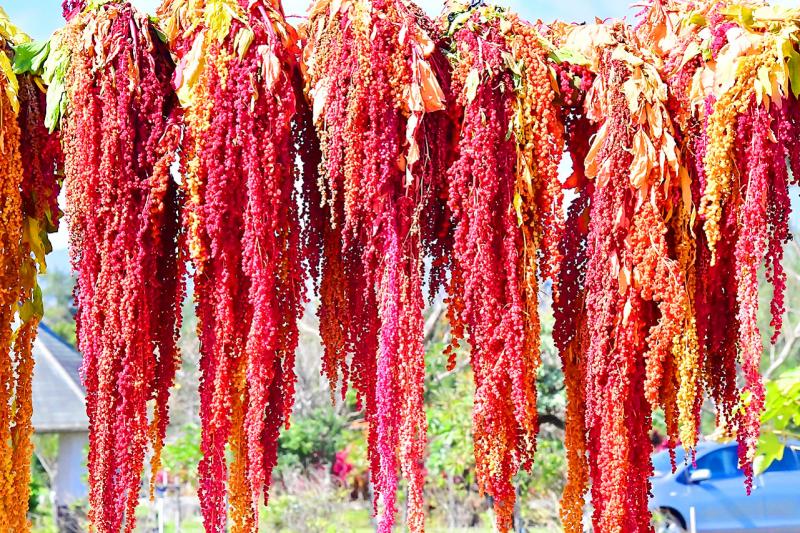Taiwan is to send plant seeds to outer space for the first time in October to observe how the space environment affects their genetic makeup, the National Space Organization (NSPO) said yesterday.
The Space Seeds for Asian Future program is being developed by the Japan Aerospace Exploration Agency. Nine nations, including Taiwan, are participating in the program this year, with 16 kinds of seeds expected to be sent to the International Space Station (ISS), where they would stay for about four months, the NSPO said.
Participating nations have primarily chosen the seeds of endemic plants or plants with symbolic meaning, it said, adding that some are crop seeds.

Photo: Chen Hsien-i, Taipei Times
The NSPO collaborated with National Chung Hsing University’s College of Agriculture and Natural Resources and the Taiwan Agricultural Research Institute, which is overseen by the Council of Agriculture, to choose which seeds to send, it said.
The college has chosen the seeds of Formosa lambsquarters, Phalaenopsis equestris, which is a kind of “butterfly orchid” originating from Lesser Orchid Island (小蘭嶼), and sunflowers, while the institute has picked chili pepper seeds, the NSPO said.
The seeds to be sent to the ISS weigh 10g, 1g, 20g and 16g respectively, it added.
The seeds selected by the university have arrived in Japan and are expected to be sent to the US next month, the NSPO said, adding that they would be returned to Taiwan in February next year.
The university is to plant the seeds following their return and observe how factors such as microgravity and space radiation affect their growth, it said.
Experts chose which seeds to send following multiple meetings with academics specializing in plants after assessing factors such as contribution to teaching and research, and weight limits for space travel, college dean Chan Fu-chih (詹富智) said.
As Japan and the US have different regulations regarding the importation of seeds, lengthy preparations had to be made, such as filling out forms on the quarantine of imported and exported seeds, as well as advance virus tests on them, Chan said.
Formosa lambsquarters, also endemic to Taiwan, is a traditional crop grown by Aborigines, but little research has been dedicated to it, while sunflower is a common plant, making it a convenient target for observation and research, she said.
Thailand and Australia have picked the seeds of their national flowers, the ratchaphruek and the golden wattle respectively; New Zealand is sending the seeds of the pohutukawa, an endemic plant; Indonesia is sending celery and onion seeds; and Malaysia the seed of holy basil, the NSPO said.

CHAOS: Iranians took to the streets playing celebratory music after reports of Khamenei’s death on Saturday, while mourners also gathered in Tehran yesterday Iranian Supreme Leader Ayatollah Ali Khamenei was killed in a major attack on Iran launched by Israel and the US, throwing the future of the Islamic republic into doubt and raising the risk of regional instability. Iranian state television and the state-run IRNA news agency announced the 86-year-old’s death early yesterday. US President Donald Trump said it gave Iranians their “greatest chance” to “take back” their country. The announcements came after a joint US and Israeli aerial bombardment that targeted Iranian military and governmental sites. Trump said the “heavy and pinpoint bombing” would continue through the week or as long

TRUST: The KMT said it respected the US’ timing and considerations, and hoped it would continue to honor its commitments to helping Taiwan bolster its defenses and deterrence US President Donald Trump is delaying a multibillion-dollar arms sale to Taiwan to ensure his visit to Beijing is successful, a New York Times report said. The weapons sales package has stalled in the US Department of State, the report said, citing US officials it did not identify. The White House has told agencies not to push forward ahead of Trump’s meeting with Chinese President Xi Jinping (習近平), it said. The two last month held a phone call to discuss trade and geopolitical flashpoints ahead of the summit. Xi raised the Taiwan issue and urged the US to handle arms sales to

BIG SPENDERS: Foreign investors bought the most Taiwan equities since 2005, signaling confidence that an AI boom would continue to benefit chipmakers Taiwan Semiconductor Manufacturing Co’s (TSMC, 台積電) market capitalization swelled to US$2 trillion for the first time following a 4.25 percent rally in its American depositary receipts (ADR) overnight, putting the world’s biggest contract chipmaker sixth on the list of the world’s biggest companies by market capitalization, just behind Amazon.com Inc. The site CompaniesMarketcap.com ranked TSMC ahead of Saudi Aramco and Meta Platforms Inc. The Taiwanese company’s ADRs on Tuesday surged to US$385.75 on the New York Stock Exchange, as strong demand for artificial intelligence (AI) applications led to chip supply constraints and boost revenue growth to record-breaking levels. Each TSMC ADR represents

State-run CPC Corp, Taiwan (CPC, 台灣中油) yesterday said that it had confirmed on Saturday night with its liquefied natural gas (LNG) and crude oil suppliers that shipments are proceeding as scheduled and that domestic supplies remain unaffected. The CPC yesterday announced the gasoline and diesel prices will rise by NT$0.2 and NT$0.4 per liter, respectively, starting Monday, citing Middle East tensions and blizzards in the eastern United States. CPC also iterated it has been reducing the proportion of crude oil imports from the Middle East and diversifying its supply sources in the past few years in response to geopolitical risks, expanding